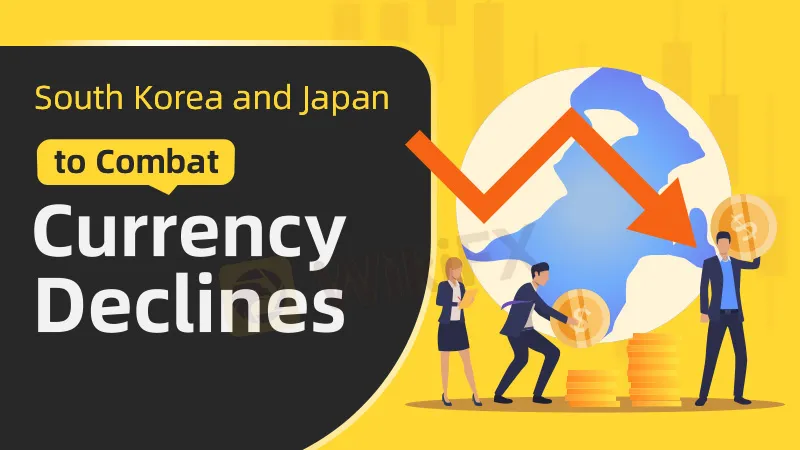简体中文
繁體中文
English
Pусский
日本語
ภาษาไทย
Tiếng Việt
Bahasa Indonesia
Español
हिन्दी
Filippiiniläinen
Français
Deutsch
Português
Türkçe
한국어
العربية
South Korea and Japan to Combat Currency Declines
Abstract:In a bilateral meeting held in Seoul, South Korean Finance Minister Choi Sang-mok and Japanese Finance Minister Shunichi Suzuki issued a joint statement expressing their serious concerns about the declining values of both countries' currencies and committed to taking appropriate steps to address the situation.

In a bilateral meeting held in Seoul on Tuesday, June 25, the finance ministers of South Korea and Japan voiced their mutual concerns over the significant declines in their respective currencies, the won and the yen. Both ministers pledged to implement measures to defend their currencies.
South Korean Finance Minister Choi Sang-mok and Japanese Finance Minister Shunichi Suzuki issued a joint statement expressing their serious concerns about the declining values of both countries' currencies and committed to taking appropriate steps to address the situation.
This meeting comes on the heels of an April trilateral meeting of finance chiefs in Washington DC, where the ministers had previously raised their currency concerns with US Treasury Secretary Janet Yellen, who acknowledged the issues.

Market participants are closely monitoring the comments from this bilateral meeting. Currently, the yen is hovering near 160 to the dollar, a level at which Japanese authorities had previously intervened to support the currency earlier this year. Meanwhile, the won, which has depreciated by about 7 percent against the dollar this year, has approached the critical 1,400 per dollar mark this week.
In his opening remarks at the meeting, South Korea's Choi emphasized the growing closeness between the two countries. He noted that the countries have become closer neighbours. He highlighted that last year, the two countries resumed currency swaps and shared the seriousness of rapid financial market volatility, providing strong support to each other.
The joint statement from the meeting may spark speculation that Japanese and Korean officials could potentially coordinate an intervention, especially as the dollar continues to strengthen due to the unexpected resilience of the US economy.
In a positive development for South Korea, the ministers welcomed Seoul's recent efforts to enhance foreign investor accessibility. This includes reforms that have led to the inclusion of South Korean securities in the FTSE World Government Bond Index.
In a bid to bolster the falling won against the dollar, South Korea's FX authorities announced on Friday that they had expanded their currency swap agreement with the National Pension Service, increasing it from US$35 billion to US$50 billion.
Through these concerted efforts and collaborations, both South Korea and Japan are taking proactive steps to stabilize their financial markets amidst ongoing currency volatility and global economic challenges.

Disclaimer:
The views in this article only represent the author's personal views, and do not constitute investment advice on this platform. This platform does not guarantee the accuracy, completeness and timeliness of the information in the article, and will not be liable for any loss caused by the use of or reliance on the information in the article.
Read more

The Daily Habits of a Profitable Trader
Every professional trader follows a structured approach to ensure they are well-prepared, disciplined, and able to seize opportunities with confidence. Whether you are a seasoned investor or an aspiring trader, adhering to a robust daily checklist can significantly enhance your performance. Use this checklist to check if you are a qualified trader

The Impact of Interest Rate Decisions on the Forex Market
Interest rate changes determine currency attractiveness, influencing capital flows and exchange rate trends. Understanding this mechanism helps investors navigate the forex market effectively.

How a Housewife Lost RM288,235 in a Facebook Investment Scam
A 47-year-old housewife in Malaysia recently fell victim to an online investment scam, losing a substantial sum of RM288,235 after engaging with a fraudulent scheme advertised on Facebook.

A Trader’s Worst Mistake: Overlooking Broker Reviews Could Cost You Everything
In today’s digital age, reviews influence nearly every decision we make. When purchasing a smartphone, television, or home appliance, we pore over customer feedback and expert opinions to ensure we’re making the right choice. So why is it that, when it comes to choosing an online broker where real money and financial security are at stake many traders neglect the crucial step of reading reviews?
WikiFX Broker
Latest News
The Withdrawal Trap: How Scam Brokers Lure Victims into Paying More
FCA to Investors: Think Twice Before Trusting These Brokers
Trump\s tariffs: How could they affect the UK and your money
Trump gambles it all on global tariffs he\s wanted for decades
TradingView Brings Live Market Charts to Telegram Users with New Mini App
Trump tariffs: How will India navigate a world on the brink of a trade war?
Interactive Brokers Launches Forecast Contracts in Canada for Market Predictions
Authorities Alert: MAS Impersonation Scam Hits Singapore
Stocks fall again as Trump tariff jitters continue
IG Group Acquires Freetrade for £160M to Expand UK Investment Market
Currency Calculator







